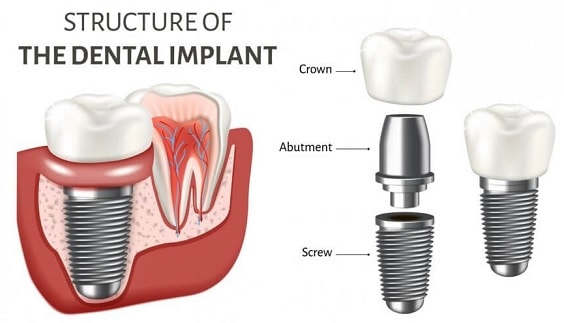Dental Implants

A dental implant is an artificial tooth root that is placed into your jaw to hold a replacement tooth or bridge. Dental implants may be an option for people who have lost a tooth or teeth due to periodontal disease, an injury, or some other reason.
How Dental implants work: Because implants fuse to your jawbone, they provide stable support for artificial teeth. Dentures and bridges mounted to implants won’t slip or shift in your mouth — an especially important benefit when eating and speaking.
This secure fit helps the dentures and bridges — as well as individual crowns placed over implants — feel more natural than conventional bridges or dentures.
A dental surgeon examines the area to be considered for the dental implant and makes a clinical assessment of whether the patient is a good candidate for a dental implant.
There are great advantages to choosing a dental implant for tooth replacement over the other options. Dental implants are conservative in that missing teeth can be replaced without affecting or altering the adjacent teeth.
Furthermore, because dental implants integrate into the bone structure, they are very stable and can have the look and feel of one’s own natural teeth.
For some people, ordinary bridges and dentures are simply not comfortable or even possible, due to sore spots, poor ridges, or gagging. In addition, ordinary bridges must be attached to teeth on either side of the space left by the missing tooth.
An advantage of implants is that no adjacent teeth need to be prepared or ground down to hold your new replacement tooth/teeth in place.
To receive implants, you need to have healthy gums and adequate bone to support the implant. You must also commit to keeping these structures healthy. Meticulous oral hygiene and regular dental visits are critical to the long-term success of dental implants.
A dental implant is a titanium post (like a tooth root) that is surgically positioned into the jawbone beneath the gum line that allows your dentist to mount replacement teeth or a bridge into that area. An implant doesn’t come loose like a denture can. Dental implants also benefit general oral health because they do not have to be anchored to other teeth, like bridges.
A dental implant is used to support one or more false teeth. It is a titanium screw that can replace the root of a tooth when it fails. Just like a tooth root, it is placed into the jawbone.
Implants are a safe, well-established treatment. It’s probably true to say that implants, much like natural teeth, will last for as long as you care for them.
Over time, technology and science have progressed to greatly improve the outcomes of dental implant placement. Today, the success rate for dental implants is close to 98%.
Oral care tips for Implant: Most dental implants are successful, and there are a few steps you can take to help ensure success and make your implant last.
- Practice good oral hygiene – Brush twice a day and floss once daily. Using interdental brushes, brushes that slide between teeth can help clean the hard to reach areas around your implant.
- Quit smoking – Smoking can weaken the bone structure and can contribute to implant failure.
- Visit your dentist – cleanings and exams every six months can help ensure your implant is in good condition, and that it stays that way.
- Avoid chewing on hard foods – Don’t chew on hard items such as ice and hard candy because they can break the crown and your natural teeth.
Are Implants safe? Implants are a safe, well-established treatment. It’s probably true to say that implants, much like natural teeth, will last for as long as you care for them.
How well you look after your implants – and whether you go for your regular maintenance appointments – will have the biggest impact on how long they will last.
If you don’t look after your implants they will develop a coating similar to what you get on neglected natural teeth. Left untreated, this can lead to gum infection, bleeding, soreness, and general discomfort. You could get all these problems with natural teeth.
If your implants are well looked after, and if the bone they are fitted to is strong and healthy, you can expect them to last for many years. However, just as with other surgical implants (such as a hip replacement) there is no lifetime guarantee.